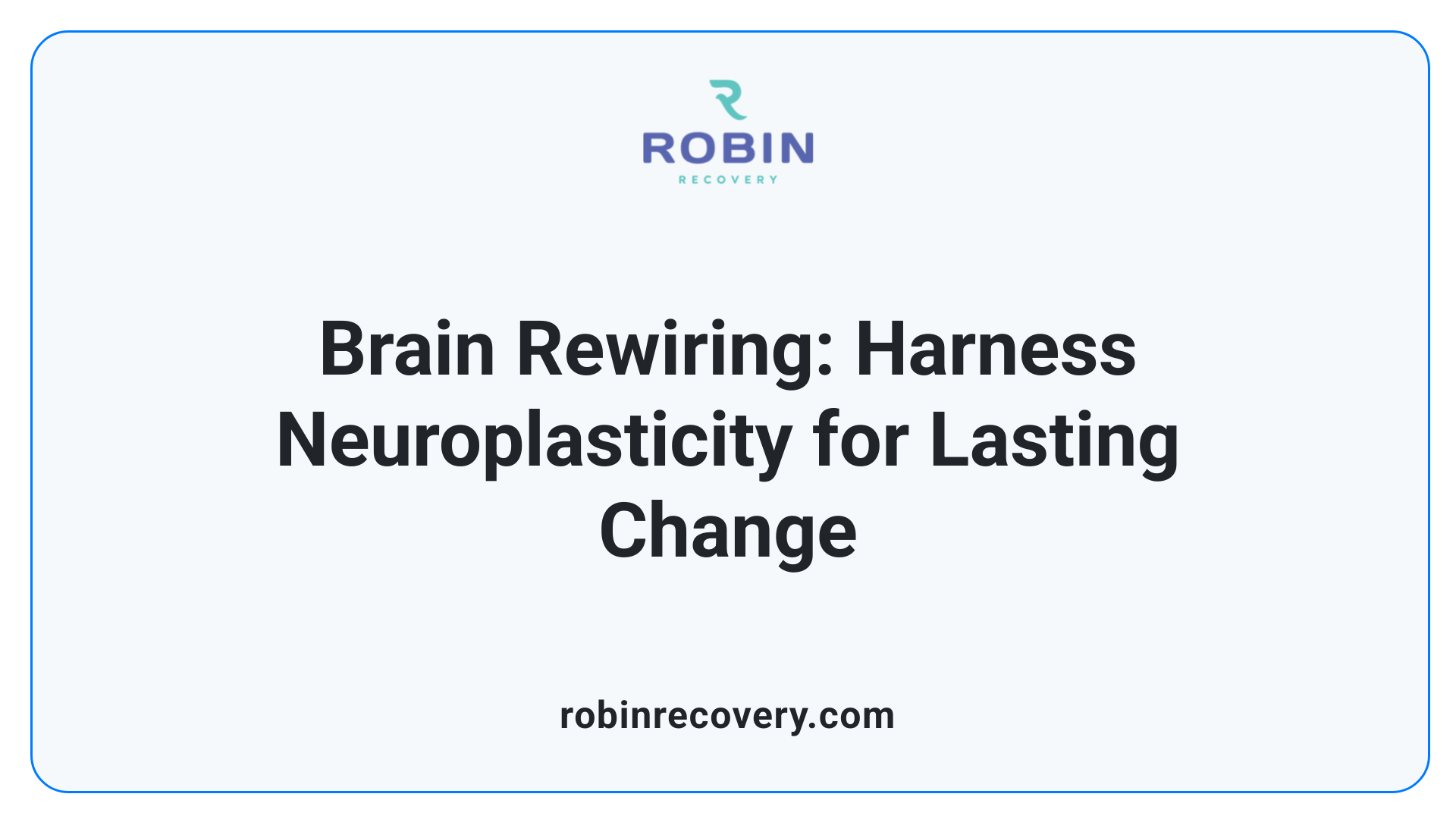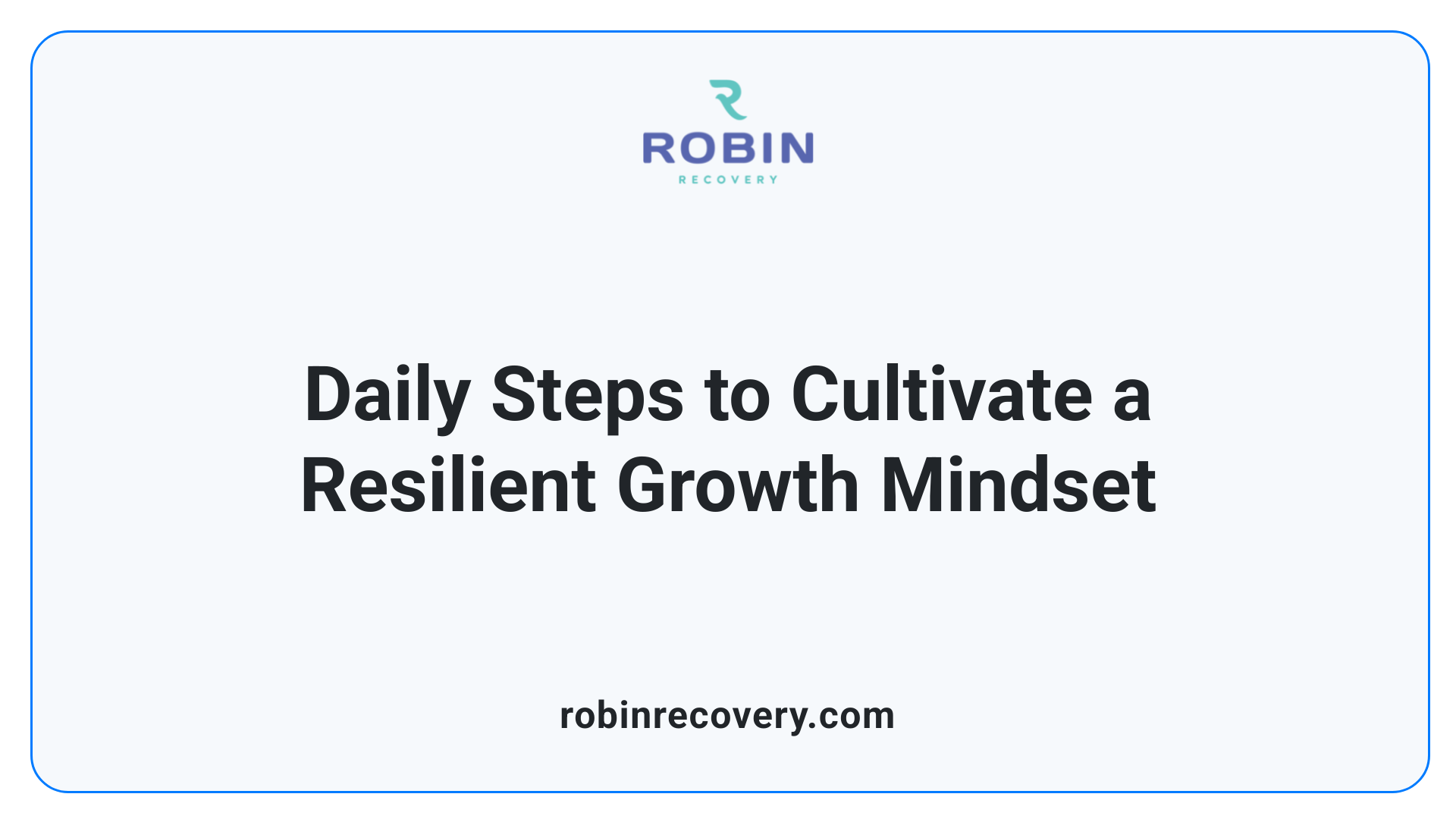How to Foster a Growth Mindset in Sobriety

Introduction to Growth Mindset and Sobriety
Embarking on a journey of sobriety can be challenging, but adopting a growth mindset offers a powerful tool for transforming setbacks into opportunities for personal development. This article explores how fostering a growth-oriented mental attitude can significantly support individuals in recovery, promoting resilience, ongoing motivation, and long-term success.
Understanding Growth Mindset vs. Fixed Mindset in Recovery

What is a growth mindset in recovery?
A growth mindset in recovery is the belief that abilities and achievements can be developed through effort, persistence, and continuous learning. It encourages individuals to view setbacks, failures, and challenges as opportunities to grow rather than as insurmountable obstacles. This attitude fosters resilience, allowing people to stay motivated and committed throughout their recovery journey, even when faced with difficulties like relapse or emotional setbacks.
Adopting a growth mindset helps individuals embrace new strategies, seek support, and maintain optimism about their potential to change. It shifts focus from a sense of helplessness to empowerment, fostering a positive approach that supports long-term sobriety and personal development. This outlook helps individuals see change as a continuous process, strengthening their motivation and capacity to overcome hurdles.
What is the difference between a fixed mindset and a growth mindset?
A fixed mindset is characterized by the belief that personal traits, talents, and intelligence are innate and unchangeable. People with a fixed mindset may avoid challenges because they fear failure or believe they lack the inherent ability to succeed. In recovery, this can manifest as giving up when faced with difficulties or feeling unworthy of change, thus sabotaging progress.
In contrast, a growth mindset operates under the belief that skills and intelligence can be cultivated through effort, learning, and resilience. Individuals with this outlook are more likely to pursue challenges, learn from setbacks, and persevere through difficulties. For those in addiction recovery, this mindset encourages viewing setbacks like relapses as part of the learning process and opportunities for growth, rather than as permanent failures.
This fundamental difference influences how individuals approach recovery efforts and set expectations for themselves. Cultivating a growth mindset can lead to increased perseverance, better handling of setbacks, and a more optimistic outlook toward achieving sobriety.
The Neuroscience Behind Change and Recovery

Neuroplasticity and its role in recovery
Neuroplasticity refers to the brain's remarkable ability to reorganize itself by forming new neural connections throughout life. This ability is fundamental to recovery from addiction, as it allows individuals to replace old, harmful habits with healthier behaviors. When someone adopts a growth mindset—believing that skills and intelligence can be developed—this mindset encourages behaviors that promote neuroplasticity. For example, practicing new coping strategies, engaging in therapy, and maintaining a positive attitude can help reshape neural pathways toward resilience and sobriety.
Brain rewiring through effort and learning
The brain’s capacity to rewire itself signifies that behavioral changes and improvements are possible at any age. Effortful learning, such as developing new routines or confronting challenges directly, stimulates neural growth. Efforts to change thinking patterns, like reframing setbacks as opportunities for growth, activate neural pathways associated with persistence and optimism. This rewiring strengthens the brain's ability to handle stress and cravings, making relapse less likely.
Scientific evidence supporting growth mindset in addiction treatment
Research by psychologist Carol Dweck and neuroscience studies collectively support the idea that cultivating a growth mindset benefits recovery. Individuals who believe they can develop skills through effort show increased resilience, greater engagement in treatment, and lower relapse rates. Neuroplasticity reinforces this by making the brain more adaptable, especially when supported with positive interventions like mindfulness, gratitude practices, and strengths-based therapies.
Understanding how neuroplasticity facilitates significant change highlights the importance of mindset. It underscores that recovery is not merely about willpower but also about harnessing the brain’s ability to adapt and grow. With ongoing effort, learning, and support, individuals have the power to rewire their brains, foster resilience, and build a lasting foundation for sobriety.
Practical Strategies to Foster a Growth Mindset in Sobriety

What strategies can help develop a growth-oriented mindset in sobriety?
Building a growth mindset during recovery involves becoming more self-aware about the beliefs that can either support or hinder progress. Recognizing that challenges are opportunities to learn and grow can shift perspectives from feeling defeated to feeling motivated.
Focusing on effort and actions rather than fixed traits promotes the understanding that skills related to recovery, such as managing cravings or building new habits, can be improved through perseverance. Seeking constructive feedback from therapists, support groups, or trusted friends can provide valuable insights and encouragement.
Reframing failures as lessons helps individuals view setbacks, like slips or cravings, not as permanent failures but as part of the healing process.
Setting clear, achievable goals—using guidelines like SMART (Specific, Measurable, Achievable, Relevant, Time-bound)—keeps motivation high and provides a sense of direction. Celebrating small wins reinforces positive behavior and resilience.
Lastly, embracing continuous learning through reflection on personal strengths and opportunities for improvement fosters a resilient, adaptive approach to recovery. Such strategies support the development of a leaner, more optimistic outlook, vital for long-term sobriety and personal growth.
What practical steps can individuals take daily to develop a growth mindset?
Daily practices play a crucial role in cultivating a growth mindset. Starting with positive affirmations helps reinforce the belief that change is possible and ongoing.
Journaling progress allows individuals to track their growth, recognize patterns, and celebrate achievements, fostering a sense of accomplishment.
Facing challenges intentionally—such as trying new activities or stepping outside comfort zones—encourages resilience and confidence.
Reframing setbacks in daily reflections as opportunities to learn helps maintain motivation and reduces feelings of failure.
Mindfulness and gratitude practices are powerful tools for cultivating optimism, reducing stress, and maintaining focus on growth rather than setbacks.
Seeking feedback regularly from support groups, mental health professionals, or mentors provides guidance and sustains motivation.
Setting short-term, manageable goals helps keep efforts focused and achievable, enhancing self-efficacy. Engaging in new hobbies or learning experiences further bolsters confidence and promotes new connections.
Consistent self-reflection, including reviewing progress and acknowledging personal strengths, solidifies the belief that effort leads to meaningful and lasting change.
Implementing these daily practices creates a supportive environment for evolving a growth mindset, ultimately aiding sustained recovery and personal development.
Building a Supportive Environment and Self-awareness

How can building mental and emotional resilience enhance sobriety efforts?
Developing resilience is vital for maintaining sobriety. It equips individuals with the strength to handle stress, cravings, and potential triggers that might otherwise lead to relapse.
Practicing gratitude, reframing negative thoughts, and setting realistic goals contribute to cultivating a positive mental state. These strategies help sustain motivation over time.
Strong coping mechanisms such as mindfulness, regular self-care, and engaging with a supportive community further bolster resilience. Therapy sessions and peer support groups provide emotional reinforcement, making setbacks less overwhelming.
Overall, resilience acts as a shield, decreasing the likelihood of relapse and enabling individuals to recover and thrive amid life’s challenges.
Integrating Positive Psychology and Mindfulness in Recovery
What are practical ways to foster a positive, change-focused mental attitude during recovery?
Developing a positive outlook during recovery can significantly impact long-term success. Practical methods include engaging in daily affirmations that reinforce belief in personal growth and change. Cultivating gratitude through journaling or reflection helps shift focus to positive aspects of life, fostering hope and resilience. Mindfulness practices, such as meditation or deep breathing exercises, support emotional regulation and self-awareness, making it easier to face challenges.
Self-care routines that prioritize physical health and emotional well-being also underpin a positive mental attitude. Building a support network—through support groups, close friends, or therapists—provides encouragement and reinforces constructive thinking. Setting small, achievable goals and celebrating every milestone helps sustain motivation and illustrates progress.
Challenging negative thoughts and reframing setbacks as opportunities for growth enhance mental toughness. Activities like volunteering or pursuing hobbies can boost mood, foster purpose, and create productive outlets for emotions. Maintaining a structured routine, regularly monitoring progress, and staying committed to core motivations help keep a hopeful perspective alive through ups and downs.
How can the principles of positive psychology support sustained sobriety?
Positive psychology emphasizes strengthening individual strengths, cultivating positive emotions, and fostering overall well-being—elements crucial for maintaining sobriety. Practices like gratitude journaling increase feelings of contentment and hope, which bolster resilience against relapse triggers.
Engaging in activities that bring joy, cultivating optimism, and focusing on personal growth reinforce the commitment to sobriety. Incorporating mindfulness and self-compassion practices helps individuals manage negative thoughts and emotional distress without self-criticism, leading to a healthier mental state.
Developing positive routines, such as regular exercise, volunteering, or pursuing meaningful hobbies, enriches life and sustains motivation. Celebrating small successes and acknowledging personal resilience reinforce a sense of achievement. These strategies shift the focus from solely avoiding relapse to enriching overall life satisfaction, making recovery a more holistic and fulfilling process.
How does a growth mindset influence resilience and recovery?
A growth mindset—a belief that abilities and intelligence can be developed—plays a vital role in overcoming the hurdles of addiction recovery. It encourages individuals to view setbacks like relapses not as failures but as opportunities for learning and growth.
This perspective increases resilience, allowing people to bounce back from setbacks with renewed effort and insight. Recognizing that change is possible and ongoing helps reduce feelings of helplessness and promotes a proactive attitude.
Adopting a growth mindset involves mindfulness of thoughts, intentionally challenging fixed beliefs, and reframing obstacles as chances to enhance skills. Reflecting on past personal growth and progress builds confidence in the capacity for change.
How can mindfulness and self-compassion practices support recovery?
Mindfulness involves paying non-judgmental attention to present experiences, which helps individuals become aware of triggers, cravings, and emotional states without reacting impulsively. Regular mindfulness exercises can reduce stress, improve emotional regulation, and enhance overall mental clarity.
Self-compassion complements mindfulness by encouraging kindness and understanding towards oneself, especially during setbacks or challenging moments. It fosters a forgiving attitude, reducing shame and guilt, which can otherwise hinder recovery.
Practices such as loving-kindness meditation, body scans, or mindful breathing cultivate compassion and acceptance. These techniques promote emotional resilience, facilitate healthier coping strategies, and strengthen the mental foundation necessary for lasting sobriety.
How can positivity practices like gratitude and mindfulness improve overall well-being?
Engaging in gratitude practices and mindfulness contributes to better mental and emotional health. They promote positive emotions such as joy, hope, and appreciation, which have been shown to support brain health and immune function.
Practicing gratitude regularly shifts focus from deficiencies and stressors to abundance and strengths. This shift supports a more optimistic outlook, vital during recovery. Mindfulness enhances emotional regulation, reduces anxiety, and fosters a sense of calm, helping individuals handle cravings, stress, and emotional lows more effectively.
These habits also deepen self-awareness, enabling clearer insights into personal triggers and progress. As a result, individuals develop a stronger sense of purpose and connection, which are essential elements in sustaining sobriety and achieving a fulfilling life.
Aspect Practice Effect Mental attitude Daily affirmations, reframing setbacks Builds confidence and optimism Emotional health Gratitude journaling, mindfulness Increases positive emotions and resilience Physical well-being Routine exercise, self-care Supports mental clarity and stress reduction Social support Joining groups, sharing progress Strengthens sense of community and accountability
These integrated approaches—grounded in understanding of neuroplasticity—highlight that change and growth are possible at any age. Developing a growth mindset, supported by positive psychology and mindfulness, offers a comprehensive path to not only overcoming addiction but also thriving in life post-recovery.
Summary and Final Thoughts
Fostering a growth mindset in sobriety is a transformative approach that empowers individuals to see challenges as opportunities, embrace change, and develop resilience. By understanding the science behind neuroplasticity and engaging in practical strategies such as setting goals, practicing gratitude, and utilizing support networks, those in recovery can significantly improve their mental and emotional well-being. Cultivating a positive attitude, self-awareness, and an environment conducive to growth helps sustain motivation and long-term sobriety. Ultimately, adopting a mindset rooted in continual learning and perseverance paves the way for lasting personal development and a healthier, more fulfilling life.
References
- Adopting a Growth Mindset for Addiction Recovery
- Choose a Growth Mindset in Recovery
- The Power of a Growth Mindset in Recovery
- Recovery Tools: Achieving a Growth Mindset
- How to Change The Way You Think | Elevate Rehab
- Positive Psychology in Addiction Recovery at Transformations Care
- Growth Mindset in Recovery
- Growth vs. Fixed Mindset in Addiction Recovery
- How a Growth Mindset Can Help You Beat Addiction
- How to Adopt a Growth Mindset for Addiction Recovery
